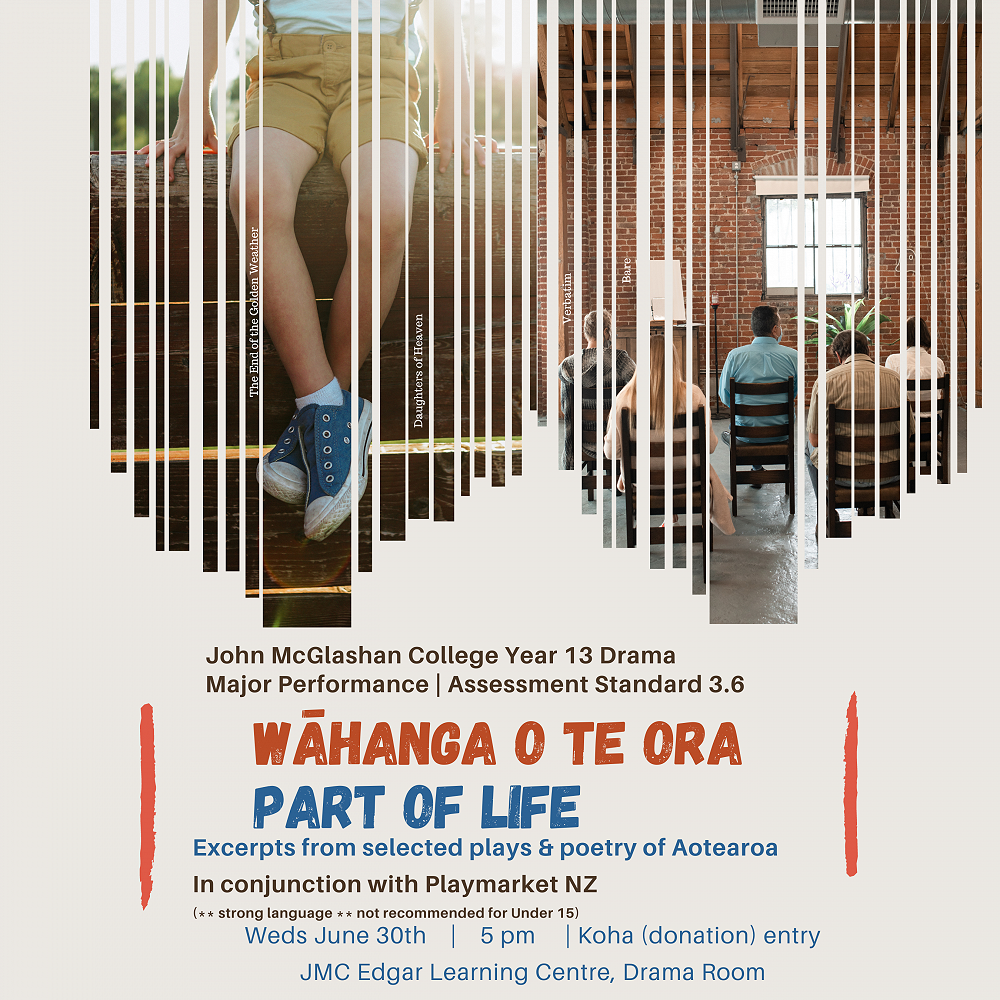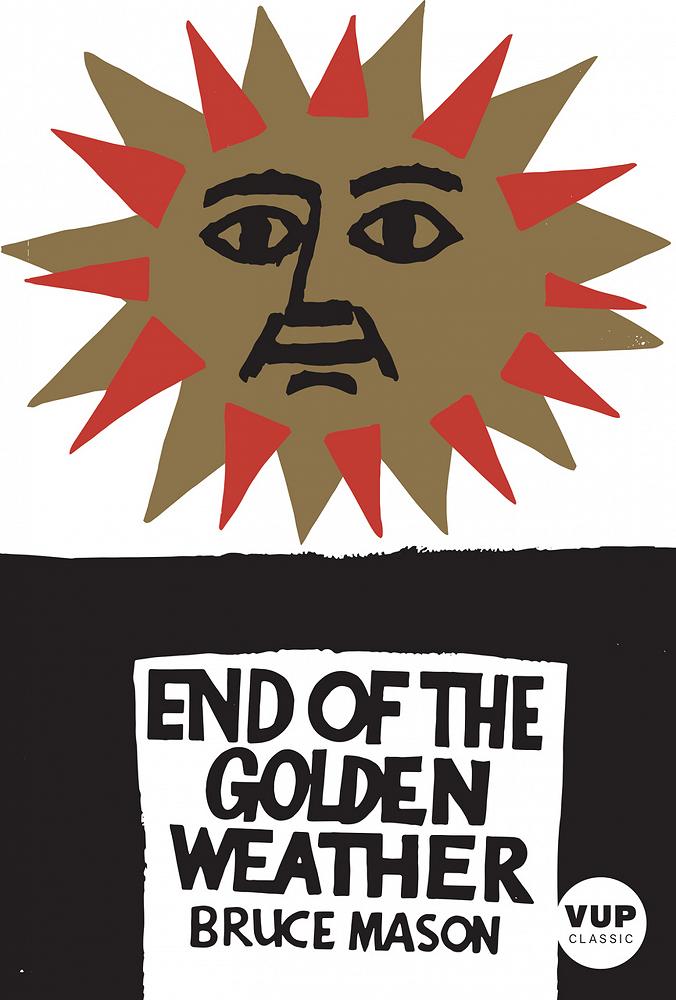Year 13 drama students are currently doing mahi towards their major performance event in week 9 this term and are excited to share their work with a public audience.

Wāhanga O Te Ora explores the works of Aotearoa theatre through a range of significant NZ plays, including:
- End of the Golden Weather by Bruce Mason -1935
- Daughters of Heaven by Michelanne Forster - 1954
- Verbatim by Miranda Harcourt & William Brandt - 1993
- Bare by Toa Fraser - 1998
Year 13 drama students have been working on Achievement Standard 3.6 Perform a Substantial Acting Role in a Significant Production all term and this will culminate in their final public performance in week 9.
Undertaking a performance of this magnitude requires many things from the actors. Preparing for their roles include:
- attending rehearsals
- learning lines to meet deadlines
- participating actively in role development activities
- annotating the performance script to indicate the blocking, intention and planning for the performance of the role
- accepting direction willingly
- co-operating with the group to enable the production to be realised
Wāhanga O Te Ora also includes several Māori waiatas and NZ performance poetry interspersed between the plays of Aotearoa.
The End of the Golden Weather

This quintessential Kiwi classic chronicles the friendship between a 12-year-old boy and the wild-limbed Firpo.
Through the boy's eyes, we see the wonder of life on a perfect beach, in an idyllic 1930's New Zealand, during a perfect summer. It's a world of magic and transformation, where anything can happen and miracles seem possible.
Actors Charlotte Werner and Maia Robertson take on the joint role of the solo narrator, with a range of scenes from this kiwi classic.
Daughters of Heaven

On 22 June 1954, in a secluded part of Victoria Park in Christchurch, Juliet Hulme and Pauline Parker battered Pauline's mother to death. This play examines the passionate friendship between two girls, and the events leading up to the murder.
Look one way and it's the story of a provincial New Zealand city being turned upside down by a murder. It's a story of Christchurch in 1954, restrained and nice with implicit British attitudes about class and gender, suddenly confronted with evil.
Look another way and Daughters of Heaven is about love - the sweeping away of reason and morality in a crazy tide of two-ness. "We had the right to do what we needed to do in the interests of our own happiness," says Juliet Hulme.
Daughters of Heaven has been a stage hit at The Court, Christchurch, Downstage, Wellington and The Globe, Dunedin.
"...the play is destined to reach a wide audience. My guess is that it will quickly become central to the canon of indigenous New Zealand drama." Shelagh Duckham Cox, New Zealand Books.
Actors Georgia Burgess and Teegan Wisnesky perform selected scenes from Daughters of Heaven, focusing on the two pivotal roles of Juliet and Pauline.
Verbatim

Created in verbatim theatre form this play is based on over forty interviews with families of imprisoned murderers, families of victims and with the offenders themselves.
Widely studied and performed, Verbatim has been presented in prisons across New Zealand. It is a story of how and why the murderers have committed their crimes and exposes some of New Zealand’s most hardened criminals.
Performed by Millie George, Lily Frewen, Kennedy Dailey, and Maggie Craig-Pearson, Verbatim is a hard-hitting one-act play that explores the voices of prisoners, and indeed their family and loved ones, some of the least heard or understood voices in society. This is their very complex story.
Bare

In 1998 Toa Frasers's play Bare made an impact on the arts scene within New Zealand. It’s a classic kiwi comedy with a hilarious matrix of urban poetry and streetwise lip. Two actors take on a range of different characters and rap and riff on body image, films, takeaway food, graffiti and English literature. This contemporary classic has earned its place as an icon of New Zealand theatre and is taught around the country as part of the Drama and English curriculum. It’s a piece involving several different monologues with a wide variety of voices, caricatures, themes and relationships. The two actors take us on a journey through a range of personalities from the late 90’s NZ. Radio DJs, Skater chicks, Burger King Employees and Shakespeare. What do all these characters have in common? Laid bare, they're all the same. Or are they?
'Bare' is the story of many characters and their intersecting lives and selected scenes are performed by Tama Anthony-Whigham and Ossian Lawrie.

You can catch this one-off performance of Wāhanga O Te Ora in the John McGlashan College Drama room, located on the basement level of the ELC at 5 pm, Wednesday, June 30th. Seats are limited and entrance is by koha (donation).
I'd also like to take this opportunity to thank the McGlashan Parents'and Friends' Association for their generous donation towards the completion of the drama room blackout, providing curtains for the final two big walls of windows in the drama room. These will help provide much-needed ambience and atmosphere during performance situations and give students the opportunity to play with darkness and light within performance contexts.
** Please note the performance is not suitable for students under 15 years of age, due to strong language.
Performance rights arranged through Playmarket NZ and
Tim Riley of Dominion Law

 Open Event Registration - Interested in enrolling?
Open Event Registration - Interested in enrolling? Employment opportunities - click if you're interested in working at McGlashan.
Employment opportunities - click if you're interested in working at McGlashan.